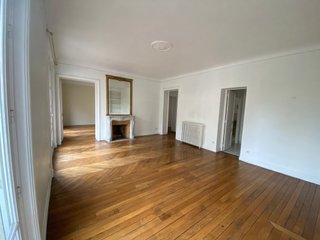
The real estate blog
by Gosset Grainville Immobilier
Paris real estate at a turning point
With the exception of very high-end real estate (+25k€/m2), where prices remain stable, thanks to the undeniable qualities of the apartments: terrace, view, high floor, high standing, excellent location, fine renovation... it's safe to say that real estate is at a turning point.
What turning point are we talking about?
For sale in Paris: Decline in transaction volumes and prices.
3 main factors are driving this change when it comes to buying a home in Paris.
1) Interest rates have risen to an average of 4.2% over 25 years, and may continue to do so. Investors, major buyers in Paris, are therefore reluctant to invest in Parisian stone. A simple bank term account today provides returns in excess of 4%, unimaginable even 2 years ago.
2) The Climate Law imposes regulations that will oblige owners to insulate their apartments better, by changing windows, insulating from the inside or installing a new ventilation system, followed by an energy-efficient heating system... projects, costs, bad information, tasks... Without a 'good rating' for energy consumption, apartments will no longer be able to be rented, and will be less attractive to buyers.
3) The tax burden continues to rise. It's true that the taxe d'habitation for principal residences has disappeared, but this has been replaced by a major increase in the taxe foncière.
So the sales market is slowing down.
Buyers are informed and apartment offers are competing. So we're surfing a buyer's market. Sellers often hold on to their price. They've bought at a high price, or they need the capital for a new purchase, not to mention bridging loans that require the expected sum.
On the other hand, the rental market is very tight. There is a lot of demand for rental properties, but few available properties.
This is because the laws allowing landlords to rent out their properties are becoming stricter, and some large landlords are not hesitating to sell their properties. This will be the case when landlords lower their demands and adjust their prices. To this we need to add the support of the banks, and the stabilization of interest rates.
So even if prices in Paris fall below €10,000/m2, let's not forget that buying property remains the only way to build up debt and capital over the long term. So let's hope that prices will adapt, banks will become more flexible and purchases will be made with peace of mind!


The ECD and its challenges
About fifteen years ago, a customer to whom I was showing an old apartment in Paris said to me, "One day, we'll buy according to the home's energy consumption.
I was sceptical, but that day has -almost- arrived.
The energy performance of a home is a criterion for choice and negotiation.
Window merchants are overwhelmed, and interior m² are shrinking under the impact of 7 to 13cm thick insulation panels...
The price/m2 is considered differently when buying a poorly-rated home.
(Reminder: Used since 2006, the Diagnostic de Performance Energétique (DPE) assesses the performance of a property by assigning it a label, from A for low-energy housing to G for very energy-intensive housing).

- For reasons of citizenship and economy : wasting energy is has-been and expensive. What's more, fossil fuels are not in demand...
- As a matter of principle : heating to death an apartment exposed to draughts and poorly insulated walls is a thing of the past.
- By obligation : From the prohibition on increasing rent in line with customary indexes to the prohibition on renting at all, insulating a dwelling is becoming a matter of urgency.
Which solutions :
Private or condominium? Both, my captain!
Co-ownership : The spring General Assemblies I attended all talked about the climate law and the obligations of co-owners.
The main obligation is to deliver a Pluriannual Work Plan (between 2023 and 2025, depending on the size of the condominium).
The Plan Pluriannuel de Travaux (PPT) is a schedule of works to be carried out over a 10-year period, in particular to protect the building and ensure its proper upkeep. It applies to condominiums over 15 years old.
(NB: It is compulsory for condominiums with more than 200 lots since 1/1/23, between 51 and 200 lots from January 1, 2024, and condominiums with no more than 50 lots from January 1, 2025).
The PPT must be carried out by a professional with proven skills and guarantees.
Some co-ownerships are debating the need for a "Diagnostic Technique Global" (DTG) or a "Diagnostic de Performance Energétique" (DPE) for the building.
This led to a great deal of discussion, debate and misunderstanding. It's not even easy for property managers to get their heads around it.
The bottom line is that something has to be done about poorly insulated buildings. That's most of them, especially in Paris. It's all very confusing, and decisions are also made on the basis of compulsory dates and state subsidies, via the Agence Climat for example.
The DTG receives €5,000 in government funding. It costs between 6,000 and +20,000€, depending on the size of the condominium. This is a collective diagnosis covering both architectural and energy aspects.
As part of this DTG, some approved organizations also supply the collective DPE.
The DPE is a lighter, more economical (but not financed...) and indispensable solution for 'judging' the quality of our energy consumption, by the rating we receive.
The aim of these diagnoses is to make recommendations to improve the energy performance (e.g. window insulation) of the home, accompanied by an assessment of their cost and effectiveness.
My opinion 🤫: a lot of studies, made compulsory and financed by the State to carry out work that seems logical, that too is an energy expense 😉
Private : Ma prime rénov, state aid, continues to support homeowners in their renovation work. Of course, several conditions must be met. But in the age of compulsory renovation, it's time to take a look at this aid and get started...
https://www.maprimerenov.gouv.fr
- Reminder of the law : the obligation to rent decent accommodation. Decency is based, among other things, on energy consumption :
from January 1, 2023, have an energy consumption (heating, lighting, hot water, ventilation, cooling, etc.), expressed as final energy, of less than 450 kWhEF/m²/year. This consumption is estimated in the DPE (note that this is final energy consumption, not primary energy consumption);
- from January 1, 2025, at least class F in the DPE;
- from January 1, 2028, at least DPE class E;
- from January 1, 2034, at least ECD class D.
Laure Gosset-Grainville

